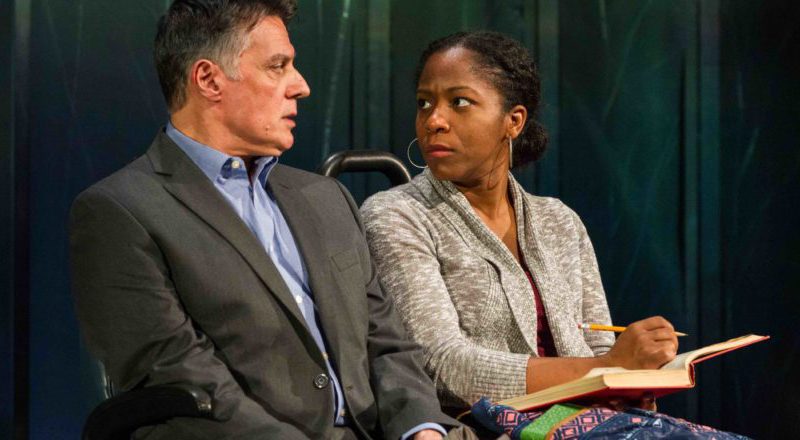INTERVIEW: Delaware Theatre Company’s Bud Martin explores racial bias in 59E59 play

The racial and economic divides in the United States are the subject of White Guy on the Bus, a new play at 59E59 Theaters in Midtown Manhattan. The production, written by Bruce Graham and directed by Bud Martin, has transferred from Delaware Theatre Company after an acclaimed run that added perspective and depth to Martin’s understanding of the chasm that exists in society between individual people and communities.
In the drama, a wealthy white businessman and a struggling black single mother ride the bus and frequently start up conversations. Their dialogue grows deep and reveals plenty of surprises along the way.
The production, which runs through April 16, stars Robert Cuccioli, Jessica Bedford, Danielle Leneé, Susan McKey and Jonathan Silver.
“Bruce Graham, the writer, and I are very good friends, and I’ve done three of his shows before, two of which I actually did at 59 E. 59th St., one called Any Given Monday when I was at Act II Playhouse, and then the other The Outgoing Tide, which was my first season at Delaware Theatre Company,” Martin said in a recent phone interview. “So he tends to send me what he writes for feedback right away when he finishes it, and he sent it to me. And I read it, and I thought, wow, this is a real departure for Bruce Graham because normally he writes dark comedy. And it was a stretch for me.”
Martin elected to present the play in a reading before mounting a full production, and the event went over wonderfully. In fact, the discussion amongst audience members went longer than the reading itself. That’s a sign of a topical drama.
“People felt like we really needed a play like this, so I scheduled it for this season,” he said. “I think so much of what’s happened lately in terms of pointing out the divide in this country and our heightened sensitivity to class and racism, the show well exceeded our expectations in Wilmington, and so far, after three previews in New York, the audience reaction has actually been better than it was down in Wilmington. So I was attracted to direct it because it’s a challenging piece, and I really love directing drama.”
Martin has been at the helm of the Delaware Theatre Company in Wilmington, Delaware, for nearly five years. He started in theater right out of college and lasted for about a decade. He transitioned into investment banking for the next 25 years, but then he returned to his first love after saying goodbye to the business world.
“I took over this little theater up in Ambler, Pennsylvania, that was really struggling, and I think my business experience helped me turn that theater around,” he said. “It was sort of my farm league where I could start practicing again and start directing. My wife said, ‘Why do you want to take over this little theater?’ I said, ‘Well, nobody is going to hire me to direct but me,’ so I spent four years there and fortunately got it very profitable and people coming back. I was going to start freelancing as a director and try to find the kind of plays that I wanted to work on and then convince a regional theater to let me do it, and when the situation at Delaware arose, it was a similar situation. They were really struggling financially and not living within their means and on the verge of going out of business, and when I asked if I thought I could save it, I thought, well, if I could save it, I don’t have to try to convince some of the regional theaters to let me do what I wanted to do.”
A REGIONAL THEATER’S MISSION
There’s a line in White Guy on the Bus that suggests that some of these racial and economic divides may never go away; however, with the recent presidential election, which has further divided people, the discussions on race and class in the United States have grown deeper.
“I felt like part of our mission as a regional theater is to look into the community and try to, as [William] Shakespeare said, it’s the responsibility of art to point a mirror at society, and you might not always like what you see,” Martin said. “So part of it is our responsibility to shine the light on issues in the community and at least provoke discussion about them and hopefully maybe cause people to change the way they think about something, act on something, to try to make a change and improvement.”
To that end, the Wilmington run of the show engaged the help of community organizations to offer discussions surrounding the issues brought up in the drama. These partnerships and the education that Martin immersed himself in opened his eyes and added new perspectives.
“One of the things that really helped me look even more closely at the play was that we brought in a social justice teacher to do equity, diversity and inclusion training with our staff in conjunction with us doing this play, and then we wanted to be able to do facilitation training so that we could lead discussions after each of the performances,” he said. “So I think that experience enabled me to have a lot more empathy to what was going on in the play.”
During the process of this training, Martin explored the theme of white privilege, and the experience seems to have been a highly personal one. “I am a white male, heterosexual, Christian, highly educated,” he said. “I’ve always sort of felt like I earned my privilege because I worked so hard and never really thought about how privilege is something that’s granted, so I became, I think, a lot more aware of my white privilege and felt like it was part of my responsibility to use that to highlight an awful lot of these issues. … We read and talked about this play for a few days before I got the actors up on their feet and started trying to move them around because it really is a debate about a lot of issues. It’s a debate about racism, looking at various classes and challenging stuff, so I feel like I became more empathetic as a result of it.”
By John Soltes / Publisher / John@HollywoodSoapbox.com
White Guy on the Bus is currently playing 59E59 Theaters in Midtown Manhattan. Click here for more information and tickets.

